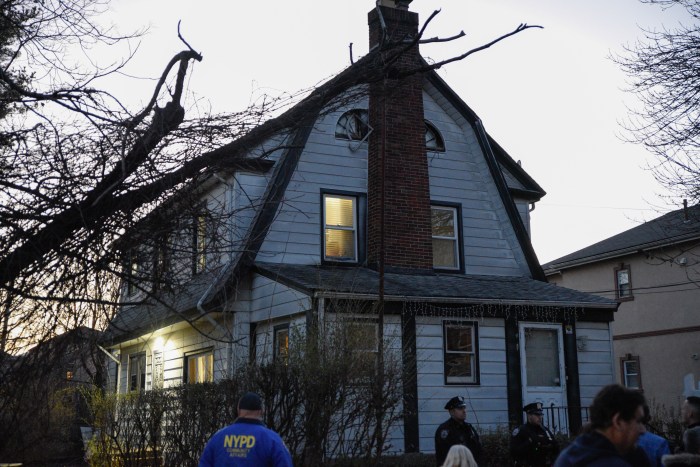By Courtney Dentch
More than 300 Queens residents learned a valuable lesson at Saturday’s Financial Planning Day: It’s never too early or too late to start investing in your financial future.
The daylong event at St. John’s University was designed to educate the public about financial planning issues. It featured a keynote speech by the Rev. Floyd Flake, head of Allen A.M.E. Church in Jamaica; a panel discussion on financial planning in turbulent times; workshops ranging from saving for college tuition to managing credit, tax tips to retirement planning; and exhibitions by more than 20 banks, investment advisers, and financial planners.
The event was presented by the Financial Planning Association of New York, the TimesLedger Newspapers, the Financial Services Institute at St. John’s, and was sponsored by Washington Mutual and JP Morgan Chase.
“What a wonderful service to our Queens people,” said Borough President Helen Marshall as she presented the sponsors with citations. “It’s a compass to help navigate the map of finances.”
From the burst of the dot-com bubble to the recession after Sept. 11 to the Enron scandal, people have begun paying more attention to their finances, exhibitors said. Aside from seeking general information, people are concerned about insurance, wills and planning, exhibitors said.
Flake, a former Democratic congressman who now heads the Allen A.M.E Church in Jamaica, one of the leading private sector employers in southeast Queens, suggested buying a home as a first investment, rather than start with a portfolio.
“Home ownership, most would agree, represents the most viable aspect of building a portfolio,” he said. “It opens up the door to lots of possibilities.”
Flake is the president of Edison Charter Schools, the nation’s largest schooling corporation, and sits on the board of Ginnie Mae, a government organization that helps finance mortgages by making them more attractive to investors.
He bought his first home in Massachusetts at the age of 24, following his father’s advice to own property rather than to rent.
“Never put yourself in a position where you’re paying for someone else’s property,” Flake’s father told him. “Own yourself a home.”
Flake has helped purchase more than five houses for his family, and at least part of the equity stems from the first house he bought in Massachusetts back when he was 24, he said.
“The value constantly builds,” Flake said.
Once the equity begins to build, however, don’t risk it by making investments without learning about them first, Flake said. Find out what you’re getting into, and if you’re unsure, go to a professional, he said.
“We need to realize we can’t make decisions about our financial futures without talking to a professional,” he said. “We have too many who don’t know about this.”
For example, he said, many people don’t realize that Social Security payments are often not enough to afford the level of comfort they’ve become accustomed to.
“You thought you’d get a lot more than you actually did,” he said. “We don’t think about it. We just assume that if the government invests it, it’s going to be there.”
But Social Security checks were never intended to be a person’s sole income, said Carlos Hernandez, a representative from the Social Security Administration.
“When Social Security was enacted, it was never designed to be sole means of support,” he said. “It was presumed a person would make sound investments and create a nest egg. This is just a part of that nest egg.”
At the panel discussions and in the workshops throughout the day, experts touched on how to build that nest egg. The panel included Donald Pitti, founder of the Financial Services Institute at St. John’s; Alfred Osborne, a financial planner with American Express Advisors; Rosilyn Overton, a planner with Mid-Atlantic Securities; and Wyatt Rushton, a planner with CIBC Oppenheimer Management.
One of the panel’s tips was to find a financial planner whom you can trust to listen to your needs. A good place to start is by talking to friends, family members, or anyone you can rely on, Pitti said.
“Ask the people who you trust who they trust,” he said. “The people who have proven to you they’re trustworthy.”
But a good planner will only take you so far if you want to keep all your eggs in one basket, Rushton said. Rather, as a protection, put some money into a variety of investments, like stocks, bonds, IRAs and real estate, he said.
“No matter how good it looks, you’ve got to maintain a diverse portfolio,” Rushton said. “It doesn’t mean you won’t lose some money, but you won’t be killed.”
You don’t need a lot of money to get started, the panel also said, but you do need a goal.
“You just have to be serious about your financial goals,” Osborne said.
More important than what you invest, however, is that you simply invest something, the panel said. Flake echoed this sentiment later in the day, saying that people should reach for a slice of that “pie in the sky” now.
“I believe that God wants us to have some pie here,” he said. “The only way to have our pie here is to learn to take advantage of the opportunities available to us.”
Reach reporter Courtney Dentch by e-mail at TimesLedger@aol.com, or by phone at 229-0300, Ext. 138.
































